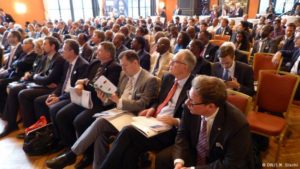- Stay Connected
Ethiopia: is Africa’s ‘lion’ ready to jump?

Following its economic success, Ethiopia has been dubbed the “African Lion.” But the current drought and a downturn in growth have taken their toll. A recent conference in Munich aimed at attracting investors.
Yinager Dessie Belay, Ethiopia’s Minister of Planning and head of his country’s business delegation to Germany, did not waste time in his lobbying efforts. “Ethiopia has many things that you need to look into,” the Minster told his German interlocutors. “A conducive business environment, political stability, sound economic policies, macroeconomic stability, abundant natural resources, a trainable workforce, low-cost energy and, above all, a sizable and captive market.”
His words were echoed by Zemedneh Negatu, Managing Director of Ernst & Young and an Ethiopian government advisor. “The biggest economy in Africa is Nigeria; South Africa got dethroned two years ago by Nigeria. Third is Angola, and guess that who is number four: Ethiopia,” Negatu told the audience.
For the past five years, Ethiopia, Africa’s second-most populous country and one of the West’s most strategic partners in the continent, has indeed been enjoying rapid growth. Germany enjoys a strong trading relationship with the East African nation, ranking the fifth largest buyer of Ethiopian goods, behind Somalia, the Netherlands, Saudi Arabia and China. According to official figures, the total value of Ethiopian exports to Germany, mainly coffee and textiles, is set to increase to 185 million euros ($209 million) in 2016. On the other hand, German exports to Ethiopia are worth much more, amounting to 238 million euros ($268 million).

However, the International Monetary Fund (IMF), in its recent outlook, said overall growth in Ethiopia was projected to slump to 4.5 percent, down from 10.2 percent the previous year. One of the contributing factors is said to be the drought that has gripped the country. Figures compiled by the Ethiopian government and its humanitarian partners suggest that more than ten million Ethiopian are now critically short of food.
El Nino expected to dent growth forecast
Asked by DW whether the drought affects German investors in Ethiopia, Germany’s Economic attaché to Ethiopia, Patrick Wegner replies: “Not so much.” According to the diplomat, not many German companies are active in the agricultural sector yet, instead mainly sell machinery and vehicles.
Michael Frick, CEO of German company INPROCON International, has come to Munich to call on business leaders to invest in Ethiopia. “There is huge potential for business opportunities. The country enjoys a very good business environment,” he tells DW. His company has been active in Ethiopia since 2007. It is among the foreign firms involved in Ethiopia’s ambitious dam construction plans, set to generate much-needed energy for economic growth.Read more:DW
